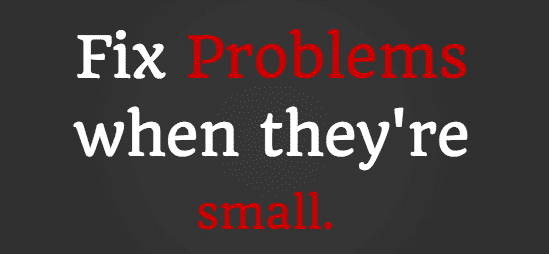"I wish you had told me that last week!
We *just* finished planning out everything for the big project and that would have been *really* helpful to know. This affects a lot of people...(sigh)...Now I have to go tell everyone..."
Ever been bitten by mismanaged expectations? Situations like above are all too common and have painful consequences.
Having learned this lesson the hard way quite a few times myself, I now use a simple phrase I repeat to my teams over and over again to combat that failure and others like it:
Manage my expectations.
When someone starts working with me, I tell them this phrase is very important to me. I believe that you can solve any problem if you acknowledge it and work together on it. And the sooner the better.
But what does it really mean to be managing expectations? How do you explain this concept to your team so it really sinks in? I use three key phrases to capture it:
 1) "If there's a problem, tell me early on."
1) "If there's a problem, tell me early on."
When dealing with a problem, timing is everything. If you fix a problem when it's small, you can often make minor adjustments to address it. It's when you don't hear about the issue, the delay, the bug, or the unforeseen problem that things quickly snowball and can become much more difficult to deal with. It's the difference between a small tweak being sufficient and having to call on all hands to fix it.
Remember, "no plan survives contact with the enemy."
No matter what kind of work your team does, there will be unforeseen issues that will emerge. Maybe there was something in the code they didn't initially realize, or marketing didn't plan for the competition to launch a similar campaign 3 days later. Or perhaps a personal issue has your team member painfully distracted. Whatever happens, making it safe for your team to find and bring up those issues to you will build a healthy culture adapting to whatever circumstances are thrown at everyone.
If you find your team doesn't seem to be comfortable coming to you with problems until they've blown up, consider if you've built enough trust and rapport with them. Also, ask yourself how you've reacted when people come to you with problems. If you tend to kill the messenger, you won't have anyone wanting to be the next messenger.
 2) "If there's a problem, we'll work together on a solution."
2) "If there's a problem, we'll work together on a solution."
Talk is cheap. Actions are what matter. By showing your team a bias towards action, you can show them that you aren't just a therapist listening to problems; you're there to then do something about it.
One of the key benefits of being a manager is that you have a higher level view of what's going on in your company. If you've been promoted to your role, you probably also know a lot more people in the company. Both of those are assets in dealing with problems; you know who else may be able to help, and may have experience in dealing with a similar problem in the past.
Also realize there is power in the word Together, as reported in this study reported in the Harvard Business Review:
"Participants in the psychologically together category worked 48% longer, solved more problems correctly, and had better recall for what they had seen. They also said that they felt less tired and depleted by the task. They also reported finding the puzzle more interesting when working together, and persisted longer."
Simply giving your people the feeling that you're in this together can make them much better employees, and it only gets better when you back it up with your actions.
 3) "We're all human and failures are expected."
3) "We're all human and failures are expected."
There are two kinds of mistakes: careless, sloppy ones, and unexpected, new ones. Clearly, the former should not be tolerated, but giving people the space to try new things and make mistakes are what creates room for breakthroughs.
When you set the expectation for your team that failing is ok, they can then feel safe admitting something didn't work instead of hiding it and turn their focus to the important thing: learning from it. When you learn from a mistake, it can provide valuable insights that will improve your team, your product, and how your company works. It also safeguards you from likely making the same mistake twice.
To truly have your team embrace failure, you must lead by example. If you project yourself as infallible, and never admit your own mistakes, how can you expect your team to? This is also where blameless post-mortems and similar discussions can be very powerful in reinforcing the innovative culture you want that values experimentation and the occasional mistake instead of fearing them.
---
Does your team manage your expectations?
All of this will help you communicate the desire to have your team manage your expectations. It may also inspire you to better do the same for your manager, who has even more people to worry about.
Don't let your team fall into the trap of running from problems. Take them head on and encourage them to manage your expectations.
What's your favorite phrase you repeat often to your team to help you better manage them?




